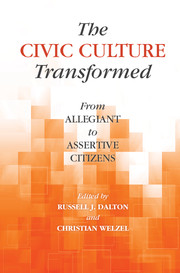Book contents
- Frontmatter
- Dedication
- Contents
- List of Figures
- List of Tables
- Contributors
- Foreword
- Preface and Acknowledgments
- 1 Political Culture and Value Change
- Part A Changing Values
- Part B Changing Images of Government
- Part C The Impact of Cultural Change
- 8 The Structure and Sources of Global Environmental Attitudes
- 9 Social Change and the Politics of Protest1
- 10 Mecca or Oil?
- 11 Allegiance Eroding
- 12 From Allegiant to Assertive Citizens
- References
- Index
12 - From Allegiant to Assertive Citizens
Published online by Cambridge University Press: 05 January 2015
- Frontmatter
- Dedication
- Contents
- List of Figures
- List of Tables
- Contributors
- Foreword
- Preface and Acknowledgments
- 1 Political Culture and Value Change
- Part A Changing Values
- Part B Changing Images of Government
- Part C The Impact of Cultural Change
- 8 The Structure and Sources of Global Environmental Attitudes
- 9 Social Change and the Politics of Protest1
- 10 Mecca or Oil?
- 11 Allegiance Eroding
- 12 From Allegiant to Assertive Citizens
- References
- Index
Summary
Still today, The Civic Culture by Gabriel Almond and Sidney Verba counts as one of the most influential studies in comparative politics. The opus was pathbreaking because it formalized a model to describe the political culture of a nation and applied this model cross-nationally in five countries. As Sidney Verba (2011) has recently suggested, The Civic Culture’s most important legacy has been planting the seed of political culture research for the following half-century.
The evolving literature on political culture has shown how citizen values can change over time, as Almond and Verba (1980) demonstrated in The Civic Culture Revisited. Indeed, their second study provided some of the first insights into the social dynamics that affect postindustrial democracies and transform their political cultures.
More recently, public opinion research has expanded beyond a small number of established democracies to a true global scale. Before that expansion, attempts to identify the political culture in the developing world were based on the impressionistic insights of expert observers. Although rich in their descriptions of local traditions, these experts could only observe what was observable; they could not provide voice to what people were thinking in autocratic states. Congruence theory suggested that autocracies were supported by a noncivic political culture in which the populace accepted or even embraced rule by monarchs, dictators, or military governments. But to what extent this assumption was true could not be tested in the absence of systematic evidence. Today, this situation has changed significantly: The World Values Survey (WVS), the Global Barometer Surveys and other cross-national survey projects provide plenty of public opinion data that can help answering the question of regime legitimacy in different parts of the world.
- Type
- Chapter
- Information
- The Civic Culture TransformedFrom Allegiant to Assertive Citizens, pp. 282 - 306Publisher: Cambridge University PressPrint publication year: 2014
- 23
- Cited by



